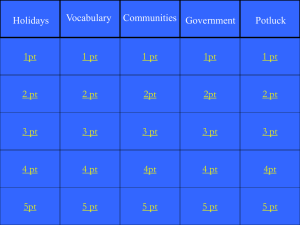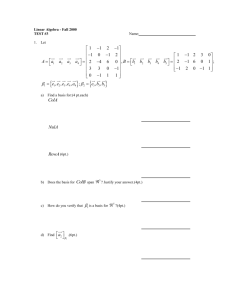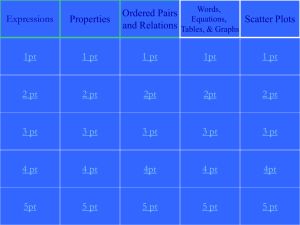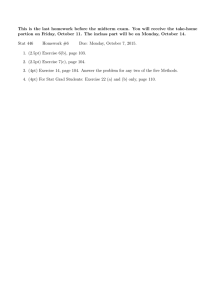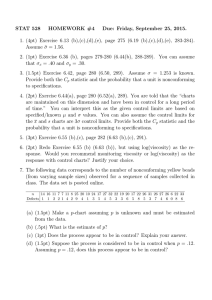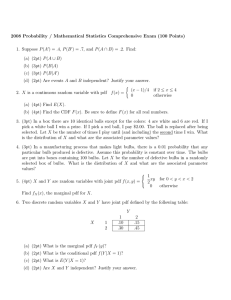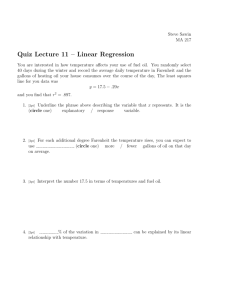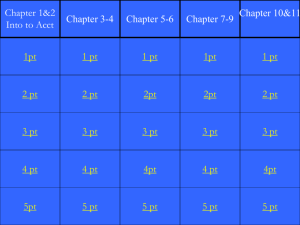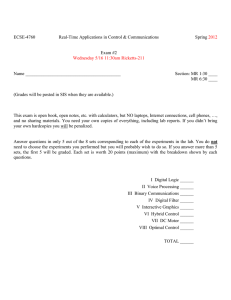RTA_Test2_13.docx
advertisement
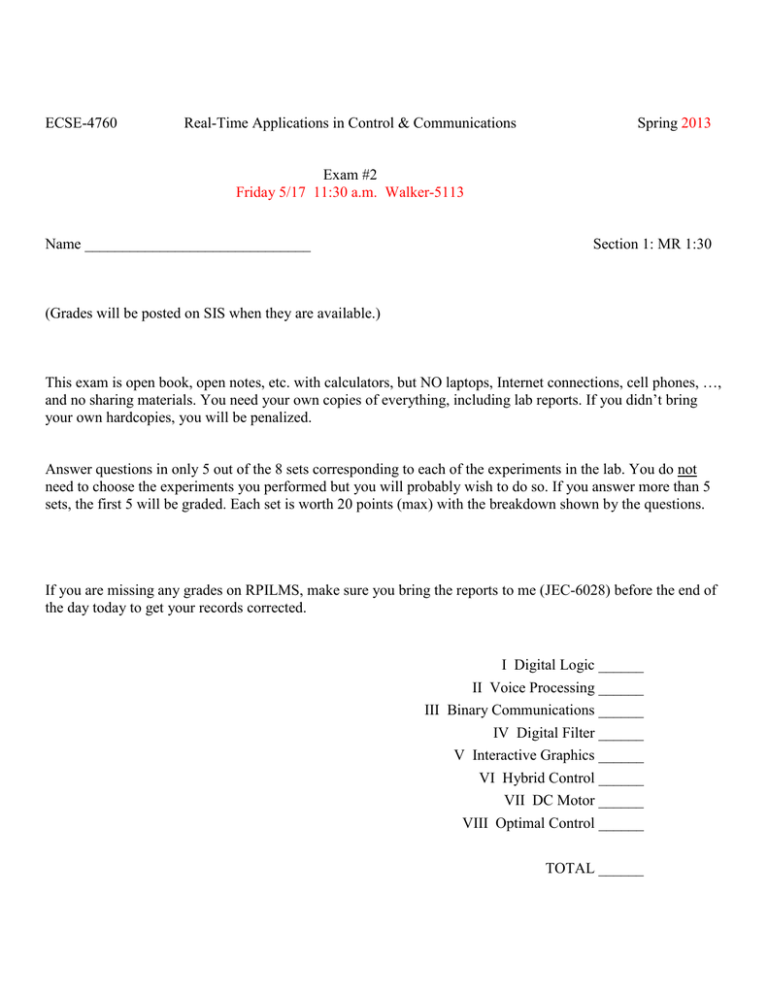
ECSE-4760 Real-Time Applications in Control & Communications Spring 2013 Exam #2 Friday 5/17 11:30 a.m. Walker-5113 Name ______________________________ Section 1: MR 1:30 (Grades will be posted on SIS when they are available.) This exam is open book, open notes, etc. with calculators, but NO laptops, Internet connections, cell phones, …, and no sharing materials. You need your own copies of everything, including lab reports. If you didn’t bring your own hardcopies, you will be penalized. Answer questions in only 5 out of the 8 sets corresponding to each of the experiments in the lab. You do not need to choose the experiments you performed but you will probably wish to do so. If you answer more than 5 sets, the first 5 will be graded. Each set is worth 20 points (max) with the breakdown shown by the questions. If you are missing any grades on RPILMS, make sure you bring the reports to me (JEC-6028) before the end of the day today to get your records corrected. I Digital Logic ______ II Voice Processing ______ III Binary Communications ______ IV Digital Filter ______ V Interactive Graphics ______ VI Hybrid Control ______ VII DC Motor ______ VIII Optimal Control ______ TOTAL ______ I Digital Logic 2013 Name _________________________ 1a. (3pt) Design a 4-bit counter that starts at 0 and skips all the prime numbers after 2 (3, 5, 7, 11, 13, 17, …) before repeating the sequence. Draw the state diagram. 1b. (3pt) Create a table that provides information needed for a D-FF implementation. 1c. (1pt) How many unused states are there? 1d. (1pt) How many K-maps are needed to determine the FF input functions? 1e. (1pt) What would be the number of input functions if JK-FFs or T-FFs were used? 1f. (4pt) Set up the K-map for the MSB FF and find the simplified function. I Digital Logic 2013 Name _________________________ 1g. (4pt) Would the function in 1f be simpler (needing fewer logic gates) if T-FFs were used? Explain. 2. (3pt) For any state machine design with more than 8 states, is it possible to use 2 or 3 different types of FFs (D, T, JK) for any state bit? If so, what may be the advantage? II Voice Processing 2013 Name _________________________ 1. (6pt) If a band-limited signal between 4kHz and 8kHz is sampled at 8kHz is it possible to reconstruct the original signal without aliasing if ideal filters are available? Explain how, or why it is not possible. Draw diagrams to help explain your position. 2a. (4pt) For a 1-bit delta modulator with a fixed sampling frequency of 48kHz and an input sine wave whose frequency is 2.5kHz, why does changing only the amplitude of the sine wave change the quality of its reconstruction? 2b. (3pt) For the system in 2a, which is an appropriate value for B when there is NO deadband and the amplitude of the sine wave is 2.5Vp-p? i) 0.1V ii) 0.35V iii) 0.5V iv) 1.0V II Voice Processing 2013 Name _________________________ 3. (4pt) The modulator below is made by combining 2 deadband modulators with Y > X and Z > W. Draw the effective q(kT) vs. e(kT) plot. Label points on the input and output axes as functions of the values W, X, Y, and Z (i.e. W x Y, 2W + X, etc.). Z -Y Y -Z W -X X -W ADD TO PREVIOUS 4. (3pt) How do advanced signal compression techniques such as LPC achieve their low bit rates? III Binary Communications 2013 Name _________________________ 1. (4pt) For a code with a minimum Hamming distance of 5, what are the two extremes the code is capable of in terms of the error detection and auto correction? 2a. (3pt) For the following variation of a Hamming code: m1 c1 m2 c2 m3 c3 c1 = m1 m2 m3 c2 = m2 m3 m4 c3 = m1 m2 m4 m4 what word was sent if 1 0 1 1 0 0 1 is received. 2b. (2pt) What is the minimum distance between code words? 2c. (2pt) What can this code do if 2 bits are received in error? 3. (2pt) What is the minimum distance between code words for a code that can detect 1 and 3 bit errors, but not 2 bit errors? 4. (2pt) For a transmission system using both in-phase and quadrature signals with RMS amplitude = 1V and 90° between each signal, what is the minimum and maximum separation between any signals, in volts (RMS)? 5. (3pt) How does the signal power of the Lab’s PAM digital output in NRZ mode compare to the signal power of the analog input? i) Digital power < Analog power ii) Digital power ≈ Analog power iii) Digital power > Analog power 6. (2pt) What is the approximate digital signal power (V2rms) for a RZ (RTZ) PCM output with a 3V pulse amplitude if the input triangle wave has a 12Vp-p amplitude of sufficiently low frequency? IV Digital Filter 2013 Name _________________________ 1. (4pt) A 4th order analog HPF was transformed using a scaled bilinear with fs = 48kHz. What was the original (analog) cutoff frequency of the filter if its Hyperception DSP board filter had a cutoff frequency of 8kHz? 2. Design an 8th order Chebyshev I band pass digital filter with a center frequency of 6kHz and fs = 48kHz, that is 3dB down @ 8kHz and >30dB down @ 10kHz. 2a. (5pt) Sketch its approximate pole-zero diagram 2b. (4pt) Sketch |H(ej)| vs. for 0 ≤ ≤ in dB. IV Digital Filter 2013 Name _________________________ 3. (4pt) A 10th order Butterworth & Chebyshev I BSF (don’t care about unity gain at peak output) have a sample frequency of 60kHz and a notch at 15kHz. What is the numerator of H(z)? Give answer as a 10th order polynomial in z with real coefficients. 4. (3pt) A 50% duty cycle square wave (with a D.C. offset) has an analog frequency spectrum A 2 sinc( 2 ff 0 ) where A is the amplitude and f0 is the frequency of the pulses. f0 = 1Hz and an ideal low pass antialiasing filter is to be used that keeps (passes) all the harmonics of the square wave that are larger the -28dB compared to the first harmonic (magnitude of the sine wave with a frequency of 1Hz). How wide should the antialiasing filter be? (Full credit will be given for just setting up the problem to solve for n, the highest harmonic to be passed.) V Interactive Graphics 2013 Name _________________________ 1a. (7pt) Using the transfer function of just the DC motor Gp (s) = 5000 , find the characteristic equation for the s2 controlled system if it is configured with phase lead compensation whose zero is at s = -4, gain is 10, and maximum phase is 20°. It is not necessary to simplify the characteristic equation. 1b. (3pt) What is the steady-state error of the controlled system in 1a to a step input 5u(t)? ì -(x - x 0 ) 2 ü exp í ý and a second uniform pdf f2(x), a rectangle 2 2 2 s î þ 2ps function with width xw and height 1/xw (area under the function is 1 for both pdfs). The a priori probabilities of the functions are equal but the cost functions can be anything. Determine how many different cases for decision boundaries exist between the two probability functions. Draw sketches of the different cases. 2. (3pt) Given a Gaussian pdf f1 (x) = 1 3. (7pt) Given 2 Gaussian pdfs with equal a priori probability, equal costs, = 0, and the parameters below, fill in values x for and y to make the decision boundary have the desired shape in the right column. The magnitude of all values should be less than 6. 1 2 3 4 5 6 7 f1(x,y) [(x0, y0) = (0,0)] x y 3 3 3 3 3 3 3 3 3 1 3 3 3 3 x y f2(x,y) [(x0, y0) = (4,4)] Boundary shape Circle Ellipse, y-direction elongation Line Parabola, x-direction (sideways) Line Hyperbola, top & bottom separated x0 = 8 Hyperbola, left & right separated VI Hybrid Control 2013 Name _________________________ ANSWER ANY COMBINATION OF QUESTIONS THAT ADD UP TO 20 POINTS. 10-POINT QUESTIONS MUST BE ANSWERED COMPLETELY. y(t) r(t) g b b 1. (10pt) Find the transfer function Y(s)/R(s) and characteristic equation for the diagram above, a system with state feedback. 2. (5pt) Which parameter(s) or factor in a PID controller of a Type I system will introduce a steady-state error between the input and output when the feedback controller is applied? Select all that apply. i) KP ii) KI iii) KD iv) the presence of a free integrator in the controller Gc(s) iv) None of these 3. (5pt) For the following response to a step 2u(t), find the PI controller gains? 2 t (sec) 0.1 0.2 VI Hybrid Control 2013 Name _________________________ 4. (5pt) What are ITAE and IAE and why should the ITAE result in less overshoot? 5. (5pt) For G p (s) = exp( -s2 ) find a Gallier-Otto PI controller gains. (s + 12 )(s + 15 ) 6. (5pt) For the Graham-Lathrop standard forms, what is the desired effective damping ratio of a controlled plant whose overall transfer function is 2nd order? For two similar systems, but one with o = 1 and one with o = 3, which has the faster rise time? 7. (5pt) Find the discrete matrices Ad, Bd, Cd, and Dd for a discrete pole-placement controller given: Ac = [-5], Bc = [3], Cc = [2], and Dc = [-0.5] when T = 0.2s. VII DC Motor Control 2013 Name _________________________ (s + 2) , find D(z), the digital compensator obtained by the Tustin (s +10) approximation with T=2s. What is the order of the digital compensator and where are its poles and zeros? 1a. (5pt) For a lead compensator Gc (s) = 7 1b. (3pt) Does the value T = 2s seem reasonable for a sample period? Justify your answer. 2. (6pt) For the Lab’s D.C. Motor system with pure proportional feedback Kp = 0.1, what are the steady state errors for a step input 4u(t) and a ramp input 2tu(t) (assuming the offset adjustments all work correctly)? 3. (6pt) Find D(z), the minimal prototype compensator for the Lab DC Motor system with T = 0.01s. VIII Optimal Control 2013 Name _________________________ 1. (2pt) For a 1st order system with no terminal state penalty, a state penalty matrix equal to 3, a control penalty matrix equal to 5, and optimally controlled time functions x(k) = 2e-5kT and u(k) = -3e-5kT, set up (but don’t solve) the equation to find the performance index of the system? 2a. (1pt) How many solutions exist to the Riccati equation for a 4st order system? 2b. (1pt) What are the dimensions of the P matrix solutions to the Riccati equation for a 4th order system? 3a. (4pt) For the system x(k+1) = 0.5x(k) - u(k), y(k) = 3x(k) + 2u(k), Q = 2 & R = 1/3, find P. 3b. (2pt) Assuming that P = 2.5 in 3a, find the feedback gain(s). 3c. (3pt) Now using the variable G as the optimal feedback gain in 3b, what is the effective A matrix for the closed-loop feedback system in 3a 3d. (1pt) TRUE or FALSE: The same solution in 3a applies to the system: x(t) = 0.5x’(t) - u(t), y(t) = 3x(t) + 2u(t), Q = 2 & R = 3. 4 1 2 4 1 2 4 1 3 4 1 3 4a. (2pt) Given the matrices: P1 1 2 1 P2 1 2 1 P3 1 2 1 P4 1 2 1 2 1 3 2 1 3 3 1 3 3 1 3 , which one(s) can’t be a solution to a Riccati equation? 4b. (4pt) For the matrices in 4a, which one(s) may be used to find the optimal state feedback gains?
